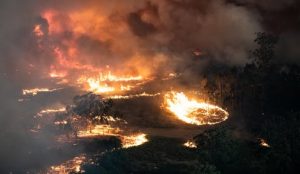The last few months have been challenging for me as the current disastrous bushfires burn across my beautiful Australian landscape from bush to beach. At times I have been catapulted back to February 2009, when my own community faced the full ferocity of Black Saturday. An event that changed me, my family and my community in so many ways.
Hearing stories of people caught in the fires, seeing homes and communities severely impacted by these current fires that have to date burned over 10 million hectares, (larger than Scotland, large than the US state of Kentucky) has seen me ask myself so many questions.
- What did the country learn from the 2009 fires?
- Why don’t some of our leaders acknowledge climate change?
- Why did our Prime Minister go to Hawaii when the bushfires were burning?
- How do we have the difficult conversations about the copious amount of donated items during and post a disaster?
- Will these communities experience the top down recovery that so damaged my community? (the legacy lives on)
- How do we support local leaders and community groups to be heard pre and post disaster?
- Will authorities listen to communities?
- How would my community almost 11 years on from Black Saturday respond now?
- How can community development inform disaster recovery?
These questions have led me to question where I live, how prepared I am for future disasters and what I can do in the future. I guess the answer to these type of questions are much easier for me than the big systems ones.
I sit here typing this with the smell of smoke in the air even though I am hundreds of kilometres from the current fires, with the knowledge that I fly to the UK in less than 3 weeks, yet wanting to do so much to support bushfire affected communities. It makes me more determined to work with other community development professionals to lobby governments for alternatives to disaster preparedness and recovery.
It’s a difficult space where community members are too often told they’re not needed and that the emergency services and government have it under control.
Well, no, they don’t and it’s hard enough to have your voice heard, let alone garner the motivation and gumption to sustain that voice.
Enough of reflective, cynical me. What makes my heart sing is seeing the incredible individual and community strength and solidarity on display across Australia. There have been stories that make me laugh and cry. I am sustained by the hope that this time will be different. Australia will be collectively reflective, and we will see changes to legislation at all levels of government, including an intentional, stronger community perspective.
As the world donates money to the various charities that support disaster recovery, I’m mindful that very few of these charities can support business and primary producers, which are vital for the economic recovery of the rural and coastal towns impacted by the current fires.
Rebuilding and recovery needs to be holistic with attention paid to all community assets, as the asset-based community-led development (ABCD) framework encourages us to pay attention to:
- Individual assets (community member’s skills, talents, passions and abilities)
- Community groups/networks (associations)
- Government and Non Government organisations (institutions)
- Physical assets (built and natural environment)
- Economic assets (productive work of individuals and local business resources and networks)
- Individual stories and community values (heritage, local identities, history and culture)
The impact of omitting any of these assets in recovery could be disastrous for communities, we need to understand what we have before we move to addressing what we need.
So, I’ll continue to focus on supporting my own community as an individual, and as part of Firefoxes Australia, and I would like to leave you with the following information if you choose to donate to bushfire affected communities.
Let’s keep the conversations going and explore the questions together and, as community development practitioners, reflect on what we can do to support communities in this time of political and climate change.
We know many of you would like to help and monetary donations are preferred over material aid as people who have lost their homes have nowhere to put material goods, and organisations such as the Red Cross and Salvation Army are already on the ground ensuring that clothing, toiletries, and food needs are being addressed.
Your donations help these organisations to support recovery
The Foundation for Rural & Regional Renewal (FRRR)
Gippsland Emergency Relief Fund
Australian Red Cross Disaster Relief Fund






